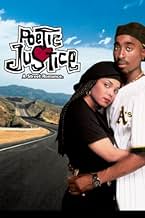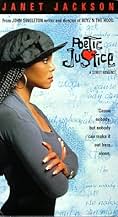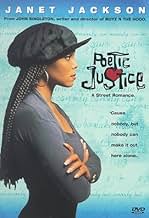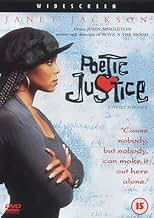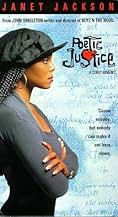IMDb-BEWERTUNG
6,1/10
17.082
IHRE BEWERTUNG
In diesem Film sehen wir die Welt mit den Augen der Hauptfigur Justice, eines jungen afroamerikanischen Dichters. Ein Postbote lädt ein paar Freunde zu einer langen Auslieferungstour über Na... Alles lesenIn diesem Film sehen wir die Welt mit den Augen der Hauptfigur Justice, eines jungen afroamerikanischen Dichters. Ein Postbote lädt ein paar Freunde zu einer langen Auslieferungstour über Nacht ein.In diesem Film sehen wir die Welt mit den Augen der Hauptfigur Justice, eines jungen afroamerikanischen Dichters. Ein Postbote lädt ein paar Freunde zu einer langen Auslieferungstour über Nacht ein.
- Für 1 Oscar nominiert
- 5 Gewinne & 5 Nominierungen insgesamt
Kina Cosper
- Female Cousin
- (as Kina V. Cosper)
John Cothran
- Uncle Earl
- (as John Cothran Jr.)
Joseph Dalu
- Policeman #7
- (as Joe Dalu)
Handlung
WUSSTEST DU SCHON:
- WissenswertesAccording to writer/producer/director John Singleton, when the 1992 Los Angeles riots occurred during filming, Tupac Shakur left the set to participate in the protest. He returned to the set in time for filming.
- PatzerIn the ambulance scene when Lucky rushes to see his cousin on the stretcher from a gunshot wound he violently shoves two police officers who try to calm him down and get him away from the body in actuality he would have been detained and arrested for assaulting an officer..
- Alternative VersionenIn the Australian Free-to-Air version, the film had about 20mins cut out of it. Even though it was shown at 11:50pm (Jan 2001), just about all swearing and fight scenes were omitted.
- VerbindungenEdited into Tupac: Resurrection (2003)
- SoundtracksRhapsody in Blue
Written by George Gershwin
Ausgewählte Rezension
After making the effective tear-jerker Boyz N The Hood, John Singleton returns to the field of film with Poetic Justice. While this one is significantly different from that masterpiece, it still has its perks and a solid message to add to its formula of an urban-drama. It is the second film in what Singleton has branded his "Hood trilogy," but yet, it is definitely the weakest of them all.
The plot: Justice (Jackson) is a young woman who lives in South Central, Los Angeles, and is still grieving over the loss of her boyfriend who was murdered during a silly confrontation. Justice writes numerous poems, and narrates them throughout the film. The actual poem were written by writer Maya Angelou, but the authenticity of the writing is the least of our concerns.
Justice works as a hairstylist, and one day, a mailman named Lucky (Shakur) waltzes in one day trying to flirt with several women, when Justice and her friend play a mean joke on him. Karma has its way of reuniting the mailman and the stylist when Justice's friend Iesha (King) forces her to come along on a trip to Oakland with her boyfriend Chicago (Torry) and his coworker Lucky. Justice needs to go for a hair show, so reluctantly agrees to hitch a ride in Lucky's mail-truck.
From then on, the film plays like a buddy road-trip film lacking the buddies. These characters must tolerate each other to survive the trip, but social and emotional conflicts continue to get in their way. Some of these situations feel genuine, but others feel contrived and meant to happen only so the film can advance.
Poetic Justice is very distant from its predecessor, with the only similarities being the setting and the fact that Lucky's uncle, seen in the end of the film, looks a lot like Laurence Fishburne's character in Boyz N The Hood. I can't quite figure out why this one is inferior to them. Maybe it's because the characters aren't as well developed and dripping with charisma, maybe because each one of the characters can be bitter and selfish at points in the film struggling socially, or maybe it's just because.
In Boyz N The Hood, Cuba Gooding Jr. was extremely developed to the point of almost going overboard. In Baby Boy, Omar Gooding was extremely developed. But in Poetic Justice, about a chunk of Janet Jackson's personality is almost snatched away. Same with the ending being a little perplexing and open for explanation.
But this can all be overlooked by two things; the writing and the acting. John Singleton manages to squeeze the premise dry in terms of character dialog. It feels like real discussions being had by real human beings. And Tupac Shakur's acting talents are definitely the strongest point in the film.
Poetic Justice has three meanings when I look at it. It describes redemption for one's previous actions, the character herself in the film, and what the slick writing achieves in this picture.
Starring: Janet Jackson, Tupac Shakur, Regina King, Joe Torry, Tyra Ferrell. Directed by: John Singleton.
The plot: Justice (Jackson) is a young woman who lives in South Central, Los Angeles, and is still grieving over the loss of her boyfriend who was murdered during a silly confrontation. Justice writes numerous poems, and narrates them throughout the film. The actual poem were written by writer Maya Angelou, but the authenticity of the writing is the least of our concerns.
Justice works as a hairstylist, and one day, a mailman named Lucky (Shakur) waltzes in one day trying to flirt with several women, when Justice and her friend play a mean joke on him. Karma has its way of reuniting the mailman and the stylist when Justice's friend Iesha (King) forces her to come along on a trip to Oakland with her boyfriend Chicago (Torry) and his coworker Lucky. Justice needs to go for a hair show, so reluctantly agrees to hitch a ride in Lucky's mail-truck.
From then on, the film plays like a buddy road-trip film lacking the buddies. These characters must tolerate each other to survive the trip, but social and emotional conflicts continue to get in their way. Some of these situations feel genuine, but others feel contrived and meant to happen only so the film can advance.
Poetic Justice is very distant from its predecessor, with the only similarities being the setting and the fact that Lucky's uncle, seen in the end of the film, looks a lot like Laurence Fishburne's character in Boyz N The Hood. I can't quite figure out why this one is inferior to them. Maybe it's because the characters aren't as well developed and dripping with charisma, maybe because each one of the characters can be bitter and selfish at points in the film struggling socially, or maybe it's just because.
In Boyz N The Hood, Cuba Gooding Jr. was extremely developed to the point of almost going overboard. In Baby Boy, Omar Gooding was extremely developed. But in Poetic Justice, about a chunk of Janet Jackson's personality is almost snatched away. Same with the ending being a little perplexing and open for explanation.
But this can all be overlooked by two things; the writing and the acting. John Singleton manages to squeeze the premise dry in terms of character dialog. It feels like real discussions being had by real human beings. And Tupac Shakur's acting talents are definitely the strongest point in the film.
Poetic Justice has three meanings when I look at it. It describes redemption for one's previous actions, the character herself in the film, and what the slick writing achieves in this picture.
Starring: Janet Jackson, Tupac Shakur, Regina King, Joe Torry, Tyra Ferrell. Directed by: John Singleton.
- StevePulaski
- 26. Sept. 2011
- Permalink
Top-Auswahl
Melde dich zum Bewerten an und greife auf die Watchlist für personalisierte Empfehlungen zu.
- How long is Poetic Justice?Powered by Alexa
Details
- Erscheinungsdatum
- Herkunftsland
- Sprache
- Auch bekannt als
- Poetic Justice: A Street Romance
- Drehorte
- Produktionsfirmen
- Weitere beteiligte Unternehmen bei IMDbPro anzeigen
Box Office
- Budget
- 14.000.000 $ (geschätzt)
- Bruttoertrag in den USA und Kanada
- 27.515.786 $
- Eröffnungswochenende in den USA und in Kanada
- 11.728.455 $
- 25. Juli 1993
- Weltweiter Bruttoertrag
- 27.515.786 $
- Laufzeit1 Stunde 49 Minuten
- Farbe
- Sound-Mix
- Seitenverhältnis
- 1.85 : 1
Zu dieser Seite beitragen
Bearbeitung vorschlagen oder fehlenden Inhalt hinzufügen





